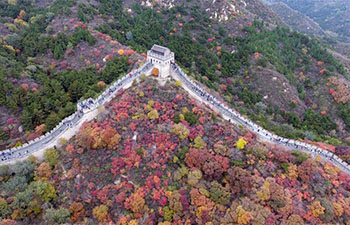by Xinhua writers Jin Minmin, Gao Pan
WASHINGTON, Aug. 12 (Xinhua) -- Doing anything unilateral against China on trade issues is expected to hurt both and produce no winner for the Trump administration, which has been searching through the policy toolbox for outdated means even without a consensus within itself.
Senior administration officials said on Saturday that Trump will direct the U.S. trade representative (USTR) next week to determine whether to investigate China's trade practices under Section 301 of the Trade Act of 1974.
The move again raises grave concerns among the business community that Washington may unilaterally impose tariffs on Chinese products, triggering bigger trade conflict between the two largest economies of the world.
Besides, the U.S. Commerce Department has launched the so-called Section 232 investigations into imported steel and aluminum products on the grounds of protecting national security. A Section 201 investigation led by U.S. International Trade Commission on imported Chinese solar cells and modules is expected to release its findings in September.
All these tools have a common feature: they were meant for the pre-WTO era. Section 301 and Section 201 of the Trade Act of 1974, and Section 232 of the Trade Expansion Act of 1962 were all put in place during the Cold War era, and were rarely used since the launch of World Trade Organization (WTO) in 1995.
In its heyday in 1980s, Section 301 was aggressively used by the Reagan administration against Japan to protect U.S. automobile and semi-conductor industries. The U.S. abuse of such unilateral actions, however, provoked widespread backlash from its major trading partners.
"This law was mostly deployed before an effective, internationally agreed system to solve disputes -- namely the WTO -- existed," said Chad Bown, a senior fellow at the Peterson Institute for International Economics, a think tank based in Washington D.C.
Trump's wish to relive the glorious days of the Reagan administration ignores how the world has tremendously changed, as the WTO dispute settlement mechanism obviates the need for unilateral actions.
The WTO mechanism has substantially lowered trade war risks and successfully held the conflict dynamics within a rule-based framework. In the words of Carla Hills, the U.S. trade representative in the early 1990s, "without the WTO it would be the law of the jungle."
That's why the U.S. governments have largely refrained from invoking the above-mentioned trade remedies since mid-1990s, in order to avoid undermining the multilateral trade system and tarnishing the U.S. reputation as a guardian of free trade.
Moreover, coercion tactics that might work on Japan in the old days stand to lose today, as the China of today is not the Japan of the 1980s. China is economically stronger, and the China-U.S. economic relations, with bilateral trade totaling 524.3 billion U.S. dollars in 2016, an increase of 209 times than in 1979, are way more important and complicated.
Given the facts of economic co-dependence between them and the huge stakes U.S. companies have piled up in Chinese markets, a trade war between the world's top two economies is doomed to a mutual assured failure, which could lead to severe job losses for both.
David Dollar, a senior fellow at the Brookings Institution and former official at the U.S. Treasury Department, has warned that "a protectionist policy would hurt the U.S. economy as much as the Chinese."
"Given today's complex value chains, a 'Chinese' product has lots of value added from the United States, Japan, South Korea, and other partners," Dollar said, noting some U.S. firms would be hurt and consumer prices rise if Washington imposes unilateral tariffs on Chinese products.
In the aftermath of 2008 financial crisis, China and the United States agreed that the rebalance of economic relations between the two countries is imperative. The key issue is how. Yesterday's tool is not capable of solving future problems. They shall find a new way forward rather than resorting to outdated tools and mindset.

















